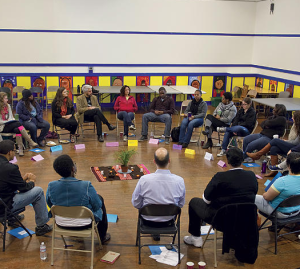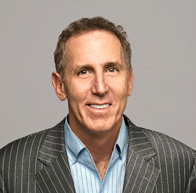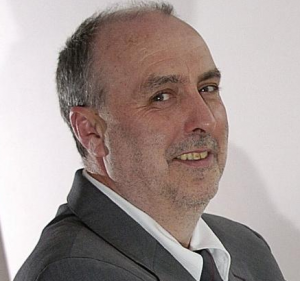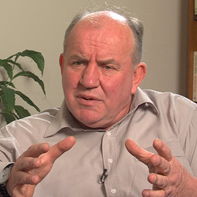News & Announcements
- Details
- Written by Joshua Wachtel
 Photo by Jim Wilson at the New York Times
Photo by Jim Wilson at the New York Times
A second article this week, about a restorative justice program in schools in Oakland, California, has appeared in a national publication, this one in the New York Times. In a piece titled, "Opening up, students transform a vicious circle," Patricia Lee Brown writes, "The approach now taking root in 21 Oakland schools, and in Chicago, Denver and Portland, Ore., tries to nip problems and violence in the bud by forging closer, franker relationships among students, teachers and administrators." The entire piece may be found here.
IIRP President Ted Wachtel has responded to the piece in his blog column at the Huffington Post, advocating "Restorative justice practices in every classroom." He writes, "I was delighted to see another New York Times article about restorative justice. ... Just across the Bay, schools in San Francisco, as well as in Detroit, Baltimore, Philadelphia, New York and hundreds of other urban, suburban and rural communities, are adopting an approach that puts restorative practices in every classroom in the building." Read the entire piece here.
- Details
- Written by Joshua Wachtel
 Photo by Ann Hermes at Christian Science MonitorStacy Teicher Khadaroo has an article in this month's Christian Science Monitor titled "Restorative justice: One high school's path to reducing suspensions by half." As so many articles do, this one begins with a story. I particularly like the way Eric Butler, the school's restorative justice coordinator, apologizes to the student who thinks she is about to get in trouble!
Photo by Ann Hermes at Christian Science MonitorStacy Teicher Khadaroo has an article in this month's Christian Science Monitor titled "Restorative justice: One high school's path to reducing suspensions by half." As so many articles do, this one begins with a story. I particularly like the way Eric Butler, the school's restorative justice coordinator, apologizes to the student who thinks she is about to get in trouble!
In the open-air corridor just outside his classroom, Eric Butler could hear snatches of escalating conflict: two girls talking trash about Mercedes Morgan – calling her the B-word and, even worse, a liar.
He saw Mercedes standing apart, pretending not to hear. He called the senior into his room. She was reluctant, resisting his first attempt to find out what was going on. So he started over and introduced himself, made her laugh, asked about her life. He didn't dress or talk like a typical teacher, and he lived nearby in the 'hood.
- Details
- Written by Joshua Wachtel
 Tony Schwartz of the Energy Project The following is a powerful excerpt from a blog post by Tony Schwartz, president and CEO of The Energy Project, at Harvard Business Review's blog network. It provides a great example of how what we would call "restorative circles," both proactive and responsive, can be used successfully to build social capital in a corporate business setting:
Tony Schwartz of the Energy Project The following is a powerful excerpt from a blog post by Tony Schwartz, president and CEO of The Energy Project, at Harvard Business Review's blog network. It provides a great example of how what we would call "restorative circles," both proactive and responsive, can be used successfully to build social capital in a corporate business setting:
For two years now, we have been holding regular "community" meetings at our office to give team members an opportunity to check in about how they're doing, not just professionally but also personally. Each person answers several questions beginning with a deceptively simple one: "How are you feeling today?"* The rest of us simply listen.
It was only when we faced a sudden crisis that I finally understood why these meetings had been so important. On a weekend last October, the 23-year-old son of one of our team members died unexpectedly and tragically. On Monday morning, I called our team together in our conference room.
- Details
- Written by Sharon Mast
This article aims to show how one nonprofit agency in Pennsylvania, USA, integrated restorative principles and processes into an early education and parenting initiative. This resulted in positive social, emotional and cognitive outcomes for young children and gave them a great foundation for success in school and in life. It also provided an opportunity for the agency’s staff to strengthen their knowledge and understanding of restorative concepts and practices, enabling them to engage more effectively as restorative leaders.
- Details
- Written by Joshua Wachtel
This TedX video features Jemma Jewkes, prison officer and restorative justice coordinator of HMP (Her Majesty's Prison) Gloucester, UK, on how restorative justice benefits both prisoners and their victims. Jewkes is project manager for Restorative Gloucestershire, which aims "to offer all victims/harmed and offenders/harmers, [who] come into contact with the criminal justice system, at whatever stage, the opportunity to engage in a restorative intervention."
Watch "TEDxYouth@Bath - Jemma Jewkes - Restorative Justice" Video at TEDxTalks.
- Details
- Written by Joshua Wachtel
IIRP President Ted Wachtel will be one of three presenters in a free webinar on Thursday, April 11th, 2013, at 11:00 am (ET), 8:00 am (PT). The webinar is part of a series of webinars funded by Health Canada on substance abuse prevention. The objective for this session is to show the linkages that are needed between "health" and "justice" programs.
The webinar is titled: "Suspension Alternatives, Diversion, Restorative Practices & Reintegration: Partnerships among Police, Health, Social Services and Education Ministries/Agencies." The other participants are Richard Deribe, Coordinator, Restorative Justice Schools Program, Nova Scotia, and Theresa Campbell, Safe Schools Coordinator, Surrey School Board, British Columbia.
- Details
- Written by Laura Mirsky
 Twenty community members from across the Lehigh Valley, Pennsylvania, USA, met Tuesday, March 26, to hear about creating a "restorative zone."
Twenty community members from across the Lehigh Valley, Pennsylvania, USA, met Tuesday, March 26, to hear about creating a "restorative zone."
The meeting was led by IIRP president Ted Wachtel and assistant professor and director of continuing education John Bailie, with presentations by Bethlehem Area School District supervisor of minority affairs Vivian Robledo-Shorey and Allentown School District executive director of community & student services Susan Lozada.
Participants included a Pennsylvania state police officer, Allentown Mayor's Office and the Lehigh Valley District Attorney's Office representatives, Allentown and Bethlehem school district administrators, a Lehigh University professor, an attorney, several pastors, community center leaders and social services providers.
- Details
- Written by Joshua Wachtel
 Paul O'Hara, Bradford Youth Offending Team Manager
Paul O'Hara, Bradford Youth Offending Team Manager
A recent article from the Bradford Telegraph and Argus, "MPs call to support successful 'restorative justice' scheme," is indicative of the kind of local support that restorative justice enjoys throughout many areas of the U.K.
The piece frames the issue in terms of a call for more money to support restorative justice programs for youth at the request of "an all-party committee."
In the U.K., youth offending teams, or YOTs, have been set up across the country. The team "sets up community services and reparation plans, and attempts to prevent youth recidivism and incarceration." (via Wikipedia) Many YOTs have adopted restorative justice as an important aspect of their work.
Paul O’Hara, the Bradford youth offending team (YOT) manager, is quoted in the article as saying, “I have queues of parents outside these clinics, who are desperate for an opportunity for their children to be given another chance.
“To date, it is still very early days, but there is a 90 per cent success rate. There is a very high level of satisfaction and a high level of involvement from victims.”
The full article can be read here.
- Details
- Written by Joshua Wachtel
 According to Amy Norton, writing for U.S. News and World Report, the American Academy of Pediatrics has taken a public stance against the use of suspensions and expulsions in schools. The article begins:
According to Amy Norton, writing for U.S. News and World Report, the American Academy of Pediatrics has taken a public stance against the use of suspensions and expulsions in schools. The article begins:
Suspending or expelling a child from school should be a rare last resort and not a routine punishment for bullying, drug use or other infractions, according to a new policy statement from the American Academy of Pediatrics (AAP).
The AAP, a leading group of pediatricians, said school "zero-tolerance" policies toward kids' behavior problems do no good.
- Details
- Written by Laura Mirsky
 Terry O’Connell, director of Real Justice Australia, a division of the International Institute for Restorative Practices (IIRP), is a retired 30-year veteran with the New South Wales Police Service, and well known as the "cop from Wagga Wagga" who developed what is now the IIRP’s Real Justice restorative conference model.
Terry O’Connell, director of Real Justice Australia, a division of the International Institute for Restorative Practices (IIRP), is a retired 30-year veteran with the New South Wales Police Service, and well known as the "cop from Wagga Wagga" who developed what is now the IIRP’s Real Justice restorative conference model.
IIRP president Ted Wachtel first heard O’Connell speak in 1994 in Pennsylvania, and was so taken with O’Connell’s work adapting the New Zealand model of family group conferencing that he founded Real Justice, now the IIRP’s restorative justice program.
The IIRP has promoted the use of O’Connell’s restorative conference process based on his "restorative questions," which foster empathy and shared understanding among offenders, victims and their respective friends and family members.

Restorative Works Year in Review 2024 (PDF)
All our donors are acknowledged annually in Restorative Works.
